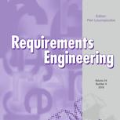
Requirements engineering increasingly occurs in multi-stakeholder environments where organizations simultaneously cooperate and compete, creating coopetitive relationships in which trust evolves dynamically based on observed behavior over repeated interactions. While conceptual modeling languages like i* represent trust relationships qualitatively, they lack computational mechanisms for analyzing how trust changes with behavioral evidence. Conversely, computational trust models from multi-agent systems provide algorithmic updating but lack grounding in requirements engineering contexts and conceptual models. This technical report bridges this gap by developing a computational trust model that extends game-theoretic foundations for strategic coopetition with dynamic trust evolution. We introduce trust as a two-layer system with immediate trust responding to current behavior and reputation tracking violation history. Trust evolves through asymmetric updating where cooperation builds trust gradually while violations erode it sharply, creating hysteresis effects and trust ceilings that constrain relationship recovery. We develop a structured translation framework enabling requirements engineers to instantiate computational trust models from i* dependency networks and organizational contexts. Comprehensive experimental validation across 78,125 parameter configurations establishes robust emergence of negativity bias, hysteresis effects, and cumulative damage amplification. Empirical validation using the Renault-Nissan Alliance case study (1999-2025) achieves 49 out of 60 validation points (81.7%), successfully reproducing documented trust evolution across five distinct relationship phases including crisis and recovery periods. This technical report builds upon its foundational companion work in arXiv:2510.18802.
翻译:暂无翻译




